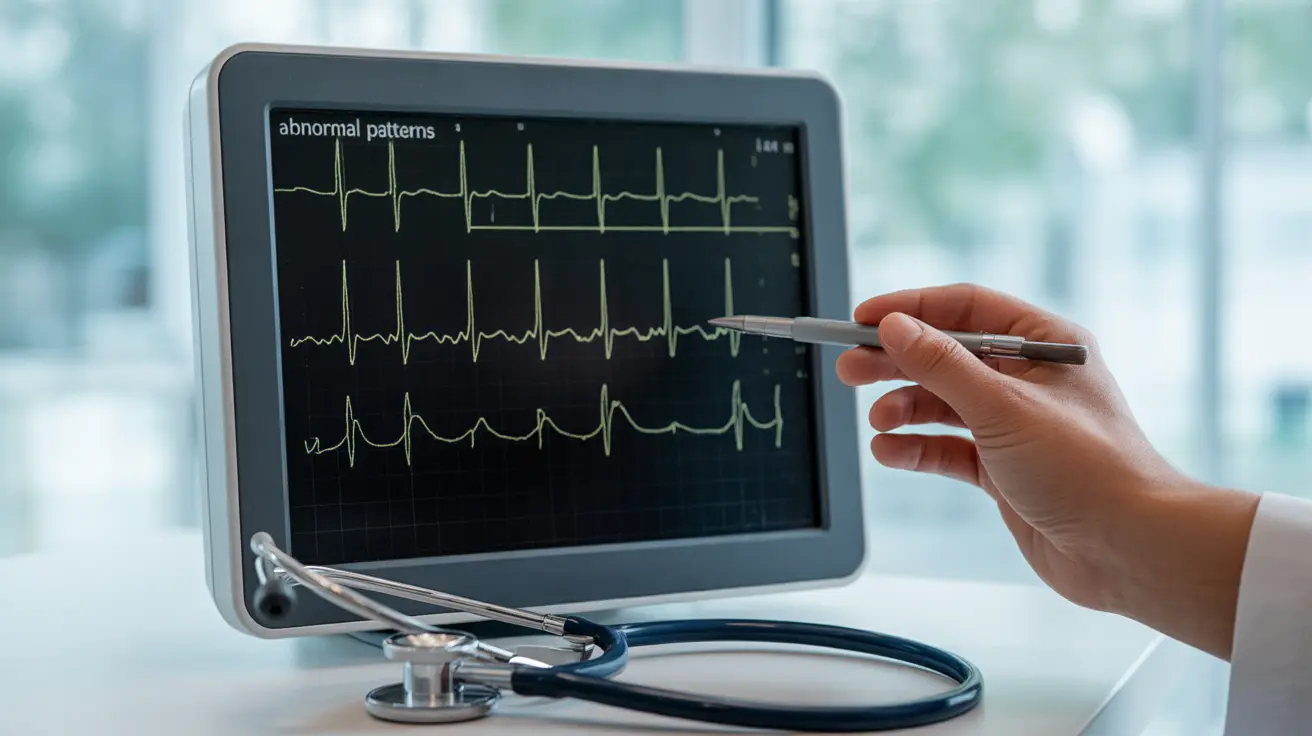An electrocardiogram (EKG or ECG) is a vital diagnostic tool that measures your heart's electrical activity. When your doctor identifies an abnormal EKG reading, it's important to understand what this means for your health and what steps might need to be taken. While an abnormal EKG can be concerning, it doesn't always indicate a serious condition.
This comprehensive guide will help you understand the implications of an abnormal EKG, its various causes, and what you can expect in terms of diagnosis and treatment.
What Makes an EKG Reading Abnormal?
An abnormal EKG can show various patterns that deviate from what doctors consider normal heart rhythm and electrical activity. These variations might indicate:
- Irregular heart rhythms (arrhythmias)
- Changes in heart rate (too fast or too slow)
- Abnormal electrical conduction patterns
- Signs of previous or current heart damage
- Structural changes in the heart
Common Causes of Abnormal EKG Results
Heart-Related Causes
Several cardiac conditions can lead to an abnormal EKG reading:
- Coronary artery disease
- Heart attack (previous or current)
- Heart valve problems
- Cardiomyopathy
- Congenital heart defects
- Pericarditis
Non-Cardiac Causes
Not all abnormal EKG results stem from heart problems. Other factors can include:
- Electrolyte imbalances
- Certain medications
- Thyroid disorders
- High blood pressure
- Obesity
- Dehydration
Understanding the Severity
The significance of an abnormal EKG varies greatly depending on the specific findings and your overall health context. Some abnormalities may be benign variations, while others could indicate serious conditions requiring immediate attention.
Symptoms Associated with Abnormal EKG
While some people with abnormal EKG results may be asymptomatic, others might experience:
- Chest pain or discomfort
- Shortness of breath
- Dizziness or lightheadedness
- Rapid or irregular heartbeat
- Fatigue
- Weakness
Diagnostic Process and Further Testing
After finding an abnormal EKG, your healthcare provider may recommend additional tests such as:
- Holter monitoring
- Stress tests
- Echocardiogram
- Blood tests
- Cardiac MRI or CT scan
Treatment Approaches
Treatment for an abnormal EKG depends on the underlying cause and may include:
- Medication adjustments
- Lifestyle modifications
- Heart medications
- Medical procedures or surgery
- Regular monitoring and follow-up care
Frequently Asked Questions
What are the common causes of an abnormal EKG and how serious are they?
Common causes range from benign conditions like electrolyte imbalances to serious cardiac issues like heart disease or arrhythmias. The severity depends on the specific abnormality and underlying cause. Some findings require immediate medical attention, while others may need only monitoring.
How do I know if an abnormal EKG result is a sign of a heart attack or other serious condition?
Specific EKG patterns, combined with symptoms like chest pain, shortness of breath, or severe fatigue, may indicate a heart attack or serious condition. Always treat chest pain as an emergency and seek immediate medical attention. Your healthcare provider can interpret the EKG in context with your symptoms and medical history.
Can an abnormal EKG result be caused by medication, and if so, how can it be managed?
Yes, certain medications can affect EKG readings. Common examples include some antidepressants, antihistamines, and heart medications. Management may involve adjusting medication dosages or switching to alternative treatments under medical supervision.
What are the symptoms that might accompany an abnormal EKG, and when should I seek medical help?
Symptoms may include chest pain, palpitations, dizziness, shortness of breath, or fatigue. Seek immediate medical attention if you experience severe chest pain, difficulty breathing, or feel faint. Any new or worsening symptoms should be evaluated by a healthcare provider.
How is an abnormal EKG typically treated or managed, and what further tests might be needed?
Treatment depends on the underlying cause and may include medications, lifestyle changes, or medical procedures. Further testing often includes Holter monitoring, stress tests, echocardiograms, or blood work to determine the exact cause and appropriate treatment plan.




